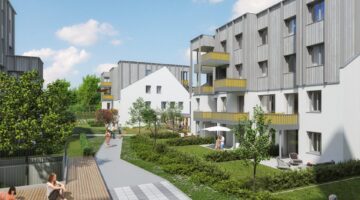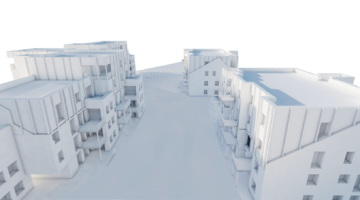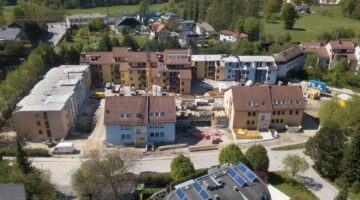


Wir inHAUSer Project
Main objectives of the project
The residential housing estate Friedrich-Inhauser-Straße is undergoing a thorough renovation and densification initiative, increasing the number of residential units from 75 to 99. Constructed in the 1980s, the complex is also undergoing enhancements with an innovative energy- and mobility-focused approach. Key aspects of the project involve barrier-free design and a social-scientific process engaging residents impacted by the refurbishment. Each household is assured the opportunity to return should they opt to do so.
Date
- 2020: En proceso
- 2022: Construction
Stakeholders
- Constructor: Stadt Salzburg
- Promotor: Heimat Österreich
- SIR (Salzburger Institute for Regional Planning and Housing)
Location
Country/Region: Austria, Salzburg
Description
The residential complex Friedrich-Inhauser Straße, erected in 1985, undergoes an extensive refurbishment due to its below-average energy condition resulting in high heating costs for the tenants occupying the 75 apartments. The necessity for a comprehensive modernization effort stems from various factors including the lack of barrier-free access, inadequate lighting, and urgent requirements for balcony, roof, and moisture insulation upgrades. This refurbishment initiative holds increased significance as it sets a precedent for similar housing estates in Salzburg to follow suit in the future.
Ownership of the buildings lies with the Salzburg municipality, which entered into a 100-year lease agreement with developer Heimat Österreich, stipulating below-market rates in exchange for district renovation. Facilitating the grant via a specific regional subsidy mechanism for housing, the Salzburg regional authority played a pivotal role in supporting the project. A collaborative planning process ensued, involving the Salzburg University of Applied Sciences and the Salzburg Institute for Regional Planning and Housing (SIR), funded by the Climate and Energy Fund under its "Smart Cities Initiative."
Residents were actively engaged through surveys to identify issues and needs, with their input factored into the design process. A multi-partner steering group was established to align on common targets and goals, ensuring a successful renovation process. Quality standards were agreed upon to uphold excellence across various project aspects.
In line with Austria's limited-profit-housing association model, a general contractor was engaged, alongside Energy Consulting Austria (ECA) for heating and power supply system design, and MO.Point for mobility services. The creation and management of the 'mobility point' were entrusted to FAMILY OF POWER e-Carsharing, facilitating various non-carsharing options such as bike-sharing and cargo-bike-sharing.
The overarching goal of the refurbishment is to reduce the carbon footprint by implementing sustainable concepts encompassing energy, mobility, and building materials. This includes insulation, construction of an extra floor using hybrid material, and a switch from natural gas to a heat pump system deriving energy from multiple sources. The temporary accommodation of the tenants was ensured by five other social housing providers in the city, who offered their dwellings for the temporary need.
Insulation of the exterior of the building with cellulose were installed. An extra floor was constructed with hybrid material (wood and concrete). The architect made the decision to keep the original wooden structure and shape of the building. As for the energy system, refurbishing the heating system of the complex was done. Natural gas was switched to a heat pump which derives 45% of its energy from wastewater, 30% from waste air, and 25% from biomass pellets and photovoltaic panels on the roof with very low temperatures.
A major innovation was offering the “Mobility Point”: a room of approx. 25 m² (accessible to all residents using their own key), comprising sharing products (mobility modules): bicycle basket trailers, bicycle child trailers, e-scooters and e-bikes, an e-cargo pedelec and an e-car. The charging stations for the e-mobility modules are located directly in or in front of the Mobility Point. In contrast the number of parking spots was reduced compared to the usual number. Moreover, they set up of a parcel room to save unnecessary journeys and related CO₂ emissions. It contains the MYFLEXBOX, an intelligently networked and flexibly usable locker system in which parcels and other items can be safely deposited and picked up around the clock.
The project's achievements have been recognized with multiple awards, including the klimaaktiv: GOLD award for sustainable residential and service buildings. Furthermore, its positive impact on the housing sector in Salzburg has spurred adoption of similar strategies by both social and private housing providers.

